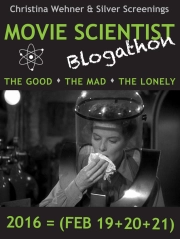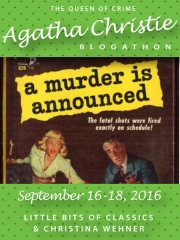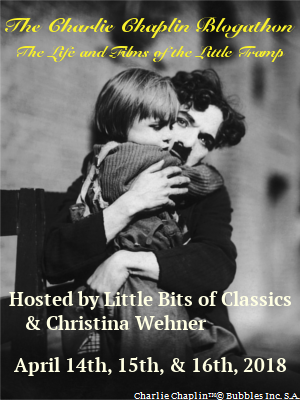 Dick Powell must have accomplished one of the more remarkable mid-career transformations of any actor from the Golden Age of Hollywood. I still experience a sense of cognitive dissonance whenever I try to think of the boyish, endearing, and dulcet tenor as the wry cynic of hard-boiled noir. He’s convincing in both manifestations, but it’s hard to think of him as the same person.
Dick Powell must have accomplished one of the more remarkable mid-career transformations of any actor from the Golden Age of Hollywood. I still experience a sense of cognitive dissonance whenever I try to think of the boyish, endearing, and dulcet tenor as the wry cynic of hard-boiled noir. He’s convincing in both manifestations, but it’s hard to think of him as the same person.
Happiness Ahead is squarely in the boyish tenor mode of his early years at Warner Bros. The film was released in 1934, around the time the Production Code was more strongly enforced, so there is little to set this film apart as a pre-code film, but it is simple, unpretentious fun.
Joan Bradford (Josephine Hutchinson) is the rich daughter of a wall street tycoon who is bored with her stuffy life and the financial pragmatism of her mother. Her father (John Halliday), however, is sympathetic to her feelings, especially since he worked his way up from newsboy. Her mother wants her to marry an equally rich man, but Joan rebels and goes out on the town to mingle with the masses.
At a Chinese nightclub, she meets Bob Lane (Dick Powell), office manager at a window washing firm and they are instantly attracted to each other. Bob and his party of friends think she’s poor and out of work (the women of the group even offer to help her find a job), so Joan decides to set up an apartment and pretend to be a working class girl like them, fearing knowledge of her wealth would change how they interact with her.
In a way, she’s trying to have the best of both worlds. The camaraderie and unaffected pleasures of the working classes (roller skating rather than opera and polo) with the wealth to be able to afford to do and live however she chooses (she even rents a piano in her apartment so she can have her new friends over for a party). However, she doesn’t know exactly how to live as a working class girl. She forgets to turn off the lights in her apartment when she leaves (something no person counting their pennies would do) and is nonchalant when one friend breaks the window in her apartment kitchen. In various ways, the film contrasts the way the rich and the poor live, though it seems to want to have it both ways, too. The film ends up like a reverse Cinderella tale for Dick Powell’s Bob.
He works in the office, as well as a window washer (trying to inspire the men, who are being threatened by a rival window washing company – a side-plot that hovers on the periphery of the film). He has a scheme to go into business for himself and he has his sales pitch down pat. And once the misunderstandings that naturally arise when Joan’s deception is discovered are cleared up, you know that his association with her father will bring him unexpected wealth.
 The film is a musical, with all the songs sung by Dick Powell (with one duet with Frank McHugh). None of the songs are especially memorable or became standards, but they are pleasant and were composed by Allie Wrubel (who is best remembered for composing the music for “Zip-a-Dee-Doo-Dah”).
The film is a musical, with all the songs sung by Dick Powell (with one duet with Frank McHugh). None of the songs are especially memorable or became standards, but they are pleasant and were composed by Allie Wrubel (who is best remembered for composing the music for “Zip-a-Dee-Doo-Dah”).
The film also has Warner Brothers’ usual array of character actors: Frank McHugh, Ruth Donnelly, Allen Jenkins, Jane Darwell. I was a little surprised to see Jane Darwell’s name at the bottom of the cast list, but I don’t think she really achieved wide recognition until she played Ma Joad in The Grapes of Wrath. I’ve seen her play a motherly sort so often, it was interesting to see her play the sour and irascible landlady in Happiness Ahead.







Simoa
April 19, 2017 at 1:20 pm
I missed this when it aired on TCM. I agree, Powell is convincing in both stages of his career and I honestly don’t know which I prefer, the dreamy crooner or the hardboiled noir guy.
LikeLiked by 1 person
christinawehner
April 19, 2017 at 1:34 pm
I know – it’s so hard to choose! It makes one wonder which persona he felt was more true to his own character or if they are both a facet or if they are both simply personas, unrelated to his real personality.
LikeLike
Simoa
April 20, 2017 at 6:48 am
Well, from what I’ve read, I think they were unrelated to his personalities. He was very ambitious and eventually left acting so he could focus on directing/producing. And definitely in his later years he seemed very stern and conservative.
LikeLiked by 1 person
christinawehner
April 20, 2017 at 10:25 am
That’s very interesting! It shows the danger of trying to equate someone’s onscreen persona with their real self. 🙂 He certainly seems to have managed his career very successfully.
LikeLiked by 1 person
Grand Old Movies
April 19, 2017 at 6:20 pm
Dick Powell is really a hidden talent. He flourished in several idioms, including musicals, film noir, and also comedy (he gives a fine, wry comic performance in “Christmas in July,” a very funny Preston Sturges film). I actually prefer the later Powell; his musical persona I find rather callow. But I sense that Powell by the late 1930s was getting tired of musicals, so he was probably wise to change. John Payne did a similar kind of turnabout. He was in musical comedy from the late 30s through the early 40s, then switched to hard-boiled noir (check him out as a washed-up boxer in “99 River Street”). I’m almost tempted to say, only in Old Hollywood could this have happened!
LikeLiked by 2 people
christinawehner
April 19, 2017 at 6:54 pm
Great point It’s funny, because I so often read how actors became pigeon-holed and yet there are these examples of Payne and Powell…and even actresses like Katharine Hepburn, who seemed to routinely change her persona. Is part of the problem that Hollywood doesn’t offer the same kind of film genres (like noir or westerns) that work really well for more experienced actors who look like they have experienced life…rather than looking so young…and callow.
I agree – I really admire Powell as an actor…especially in his later work. It’s a pity he doesn’t get more credit!
LikeLiked by 2 people
Silver Screenings
April 30, 2017 at 11:12 am
Yes, Dick Powell managed an incredible about-face in his movie characters, which rarely happens. Like a previous commenter said, I’m not sure which Dick Powell I like better, but he certainly displays a lot of talent whether as a young crooner or a world-weary gumshoe.
This is a really interesting post. Thanks for sharing your thoughts on this film. 🙂
LikeLiked by 1 person
christinawehner
April 30, 2017 at 4:37 pm
Thanks! So true! He really deserves a ton of credit for being able to make that transition. It reminds one that even male actors can have trouble finding the right niche for themselves as they grow older, especially since he did not grow into his stardom as he grew older like other actors (Bogart, Wayne), but was famous for being “young and healthy,” as his song goes in 42nd Street.
LikeLiked by 1 person